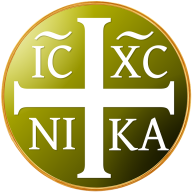
So many Orthodox Christians have grieved over the loss of physical gathering and receiving Communion. Some may not consider that before the COVID pandemic, there were people who were denied the Eucharist on principle, for identifying as or allying with LGBTQ+.
I recently listened to a podcast which chronicles the experiences of queer Christians during a different pandemic: the AIDS crisis of the 1980s. The podcast is called Plague: Untold Stories of AIDS & the Catholic Church, and it is hosted by Michael O’Loughlin, who is both gay and Catholic himself. As I listened to the podcast, I was struck with the deep resonances between the AIDS crisis and our current political climate with COVID-19 and the Black Lives Matter movement. Then, as now, people protested unjust laws, fought government mismanagement of an epidemic, prejudice and stigma, intolerant religious communities, systemic inequalities, ignorance of health risks, and a healthcare system which struggled to cope with an increasing body count. It is sobering to hear a clip from a 1989 protest at St. Patrick’s Cathedral in New York, in which a gay man shouts, Stop killing us!
How far have we really come?
Though the podcast discusses the Catholic Church, Orthodox listeners will hear many familiar stories about the treatment of LGBTQ+ folks. I found it hard to listen without tearing up when people described watching their loved ones die of AIDS and questioning whether God loved them. One of the most moving interviews occurs in the very first episode, when a man named David describes how he went back to church while suffering through his partner’s decline. He becomes emotional describing how deeply meaningful it was when his priest did not reject him, but honored his relationship with his partner and blessed the man in his last hours.
We are invited to listen to interviews with the doctors and nurses who attended to the gay community at this time. I was struck by how deeply they believed in their work. Many took the time to listen to the pain of their patients—not only due to AIDS, but also due to rejection by the Church.
It takes tremendous emotional maturity to listen compassionately to someone else’s pain, especially when it is pointed at you or the group you represent. One nun describes overcoming her discomfort at hearing patients discuss their sexual lives leading up to contracting AIDS. She concludes, “You can’t begin to talk about AIDS or minister to AIDS until you first face your own prejudices,” even if you need help to do so.
Orthodox listeners may especially empathize with the politics at play within the Catholic Church surrounding the service of these nuns. As one priest puts it: “Church politics make Washington look like kindergarten.” There were times when these nuns quietly defied their own ecclesiastical hierarchy to do the medically responsible thing, such as distributing condoms to curb the spread of HIV.
In the fifth episode, listeners will hear the incredible story of how one church in San Francisco’s Castro district became not just a haven for gay Catholics, but a consciously integrated community with some open-minded older folks. There are many examples throughout the podcast where the Orthodox Church could take notes, but this episode in particular is telling. When the Castro church seemed on the verge of closing, members actually went out into their neighborhood to let residents know that they were welcome to attend. Unsurprisingly, the church grew and still thrives today. Churches do not die because of an absence of belief. They die when they become gated communities, excluding those who can’t afford to get in.
Orthodoxy, like Catholicism, is not a monolith: there are people of many genders, orientations, and attitudes in it, including those who are allies. It is a false dichotomy to say that one can either be gay or religious, but not both. As David says, “It took me a long time to realize that I am as Catholic as the Pope, and my baptismal consecration made me as legitimate a Catholic as anybody else, and nobody’s kicking me out of my house.”
This podcast is an important effort toward the visibility of LGBTQ+ Catholics. These stories are so important in the work of recognizing that diversity in creation is not a mistake.
I have a feeling that the Orthodox community has its own untold narratives, and I would love to hear them. If you’re interested in being interviewed about your own experiences, either with the AIDS crisis specifically, or with being LGBTQ+ in the Orthodox Church, I’d love to talk to you. It is likely that I would put this material into a research paper. My email is lrb681@mun.ca. To exist is to resist.
See the Bridging Voices, Fifty Years after Stonewall, Sexuality and Gender, and Warwick Files sections in our Archives 2017-19 and/or Archives 2020.
Lydia Bringerud holds a PhD in folklore from Memorial University of Newfoundland in St. John’s and an MA in folklore from Indiana University in Bloomington. Her doctoral research focused primarily on American converts to Eastern Orthodox Christianity, as well as attitudes toward authority, obedience, cultural conflict, and the position of women. Her dissertation is entitled Whose Tradition? Adapting Orthodox Christianity in North America. She has written previously for Orthodoxy in Dialogue and co-moderates Orthodoxy in Dialogue’s Facebook group. She currently works at a public library in San Diego CA.


Pingback: IN CASE YOU MISSED IT: JUNE | ORTHODOXY IN DIALOGUE